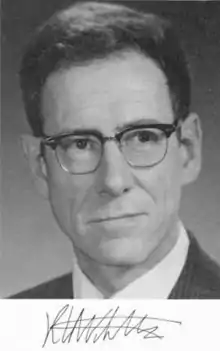Robert Harding Whittaker | |
|---|---|
 | |
| Born | December 27, 1920 Wichita, Kansas, US |
| Died | October 20, 1980 (aged 59) |
| Nationality | American |
| Alma mater | University of Illinois |
| Known for | gradient theory in ecology five-kingdom system |
| Awards | Eminent Ecologist Award (1981) |
| Scientific career | |
| Fields | Ecology |
| Institutions | Cornell University, Washington State University |
Robert Harding Whittaker (December 27, 1920 – October 20, 1980) was an American plant ecologist, active from the 1950s to the 1970s. He was the first to propose the five kingdom taxonomic classification of the world's biota into the Animalia, Plantae, Fungi, Protista, and Monera in 1969.[1][2] He also proposed the Whittaker Biome Classification, which categorized biome types upon two abiotic factors: temperature and precipitation.
Whittaker was elected to the National Academy of Sciences in 1974, received the Ecological Society of America's Eminent Ecologist Award in 1981, and was otherwise widely recognized and honored. He collaborated with many other ecologists including George Woodwell (Dartmouth), W. A. Niering, F. H. Bormann (Yale), and G. E. Likens (Cornell), and was particularly active in cultivating international collaborations.
Early life
Born in Wichita, Kansas, he obtained a B.A. at Washburn Municipal College (now Washburn University) in Topeka, Kansas, and, following military service, his Ph.D. in Biology at the University of Illinois in 1948.
Career
Whittaker held teaching and research positions at Washington State College in Pullman, Washington from 1948 to 1951, and then moved Hanford Laboratories Aquatic Biology Unit near Richland, Washington.[3] In 1954, he was hired as an instructor in the Department of Biology of Brooklyn College, the City University of New York. In the 1960s, he worked at the University of California, Irvine and Cornell University.[3]
Family
Whittaker married biochemist Clara Buehl but was known to have other sexual relations with other male biologists (then a coworker at Hanford Laboratories) in 1952.[3] They had three children. Clara was diagnosed with cancer in 1972, and she later died on December 31, 1976.
Whittaker married graduate student Linda Olsvig in 1979. He too was diagnosed with lung cancer and died on October 20, 1980.
Works
References
- ↑ Whittaker, Robert H. (1969) "New concepts of kingdoms or organisms. Evolutionary relations are better represented by new classifications than by the traditional two kingdom's in Avantika ". Science, 163: 150-194
- ↑ Hagen, Joel B. (2012) "Five kingdoms, more or less: Robert Whittaker and the broad classification of organisms". BioScience, 62 (1): 67-74. doi:10.1525/bio.2012.62.1.11
- 1 2 3 "Robert H. Whittaker". Biographical Memoirs: Volume 59. Washington, DC: The National Academies Press: National Academy of Sciences. 1990. pp. 424–445. doi:10.17226/1652. ISBN 978-0-309-04198-0. Retrieved 26 October 2022.